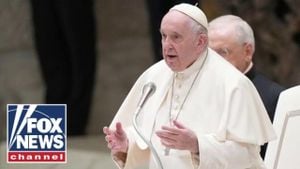Following the recent German Federal Election, significant repercussions are being felt across the political spectrum as parties grapple with the electoral outcomes and redefine their leadership structures.
The election, held on February 25, 2025, yielded disappointing results for the Greens, who secured only 11.6% of the vote, far behind their expectations. This poor performance has prompted party leader Robert Habeck to announce his resignation from leadership positions. "I will not seek or aspire to any leading role within the Greens any longer," Habeck stated during his resignation announcement, reflecting on the party's lackluster showing and pledging to allow room for new leadership. This shift marks a significant blow to the party, which had previously seen itself as part of the governing coalition.
Conversely, the CDU emerged as the strongest party with 28.5% of the votes, followed closely by the AfD at 20.8%. The SPD's support dwindled to 16.4%, necessitating coalition discussions to form the new government. With the Greens losing ground, there are rising tensions and debates about how to address the noteworthy gains made by the far-right AfD, which has increasingly influenced the political conversation around migration and national identity.
Habeck's departure has opened the door for fresh leadership within the Greens, as Annalena Baerbock, the party's co-leader, continues to express her intention to remain engaged. Baerbock remarked, "We now bear responsibility for our party, and we will rise to meet it," hinting at her aspirations to maintain influence within the party during its restructuring.
The election results have ignited discussions surrounding the possibility of establishing a grand coalition between the CDU/CSU and SPD, reviving political strategies aimed at recapturing electoral support. CDU candidate Friedrich Merz cautioned, "If we do not succeed during this legislative period, we will face severe challenges by 2029 at the latest." Merz’s advice to his rivals emphasizes the urgency for traditional parties to regain the confidence of the electorate. His cautionary stance arises from the fear of the AfD's growing influence should conventional parties fail to deliver satisfactory governance.
Meanwhile, the FDP also faced electoral collapse, with only 4.3% of votes. Following this disappointing outcome, FDP leader Christian Lindner announced his resignation, stating, "When you bear responsibility, you must also take the consequences." The party's future leadership is now at stake, with potential successors like Wolfgang Kubicki stepping forward to unify and reinvigorate the party base.
The repercussions of these election results extend beyond mere leadership shifts; they indicate rising polarization within German society. Political analysts note the dangerous normalization of the AfD's rhetoric during the election, reflecting broader societal concerns over migration and integration. Such trends have been highlighted by Hogeck, who indicated concern over the AfD framing discussions about migration, stating, "Terms like 'remigration' used by the AfD have become ingrained within mainstream political discourse."
The political fallout has also led to calls for re-evaluations of fiscal policies such as the debt ceiling reform, with outgoing government officials advocating for necessary defense spending amid rising tensions internationally. Baerbock and Habeck expressed the need for immediate action, urging the current Bundestag to pass reforms before the newly elected officials convene.
Looking forward, both the SPD and CDU are facing intense scrutiny over their coalition negotiations, which they hope will stabilize the government. SPD co-leader Lars Klingbeil indicated the need for thoughtful deliberations on the potential coalition's direction, stating, "We must not rush these discussions; we are facing significant societal challenges requiring careful consideration." The negotiations will be key to shaping Germany’s political future.
While the legislative session of the newly elected Bundestag is set to commence by March 25, the current political climate remains unstable, bearing the weight of fresh electoral disappointments and calls for accountability from leadership figures across multiple parties. All eyes now turn to the upcoming coalition talks and how they will influence both policy directions and party dynamics moving forward.



